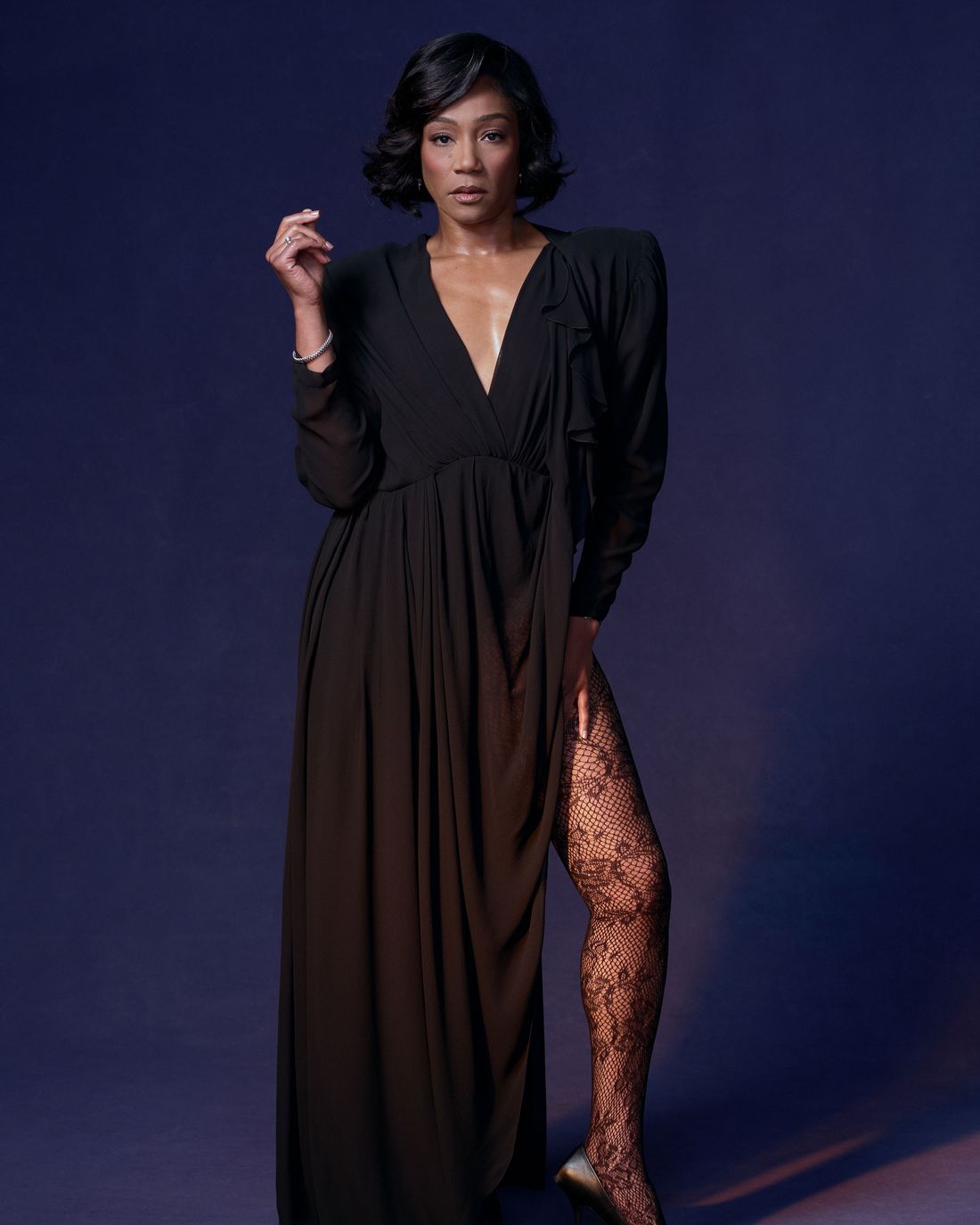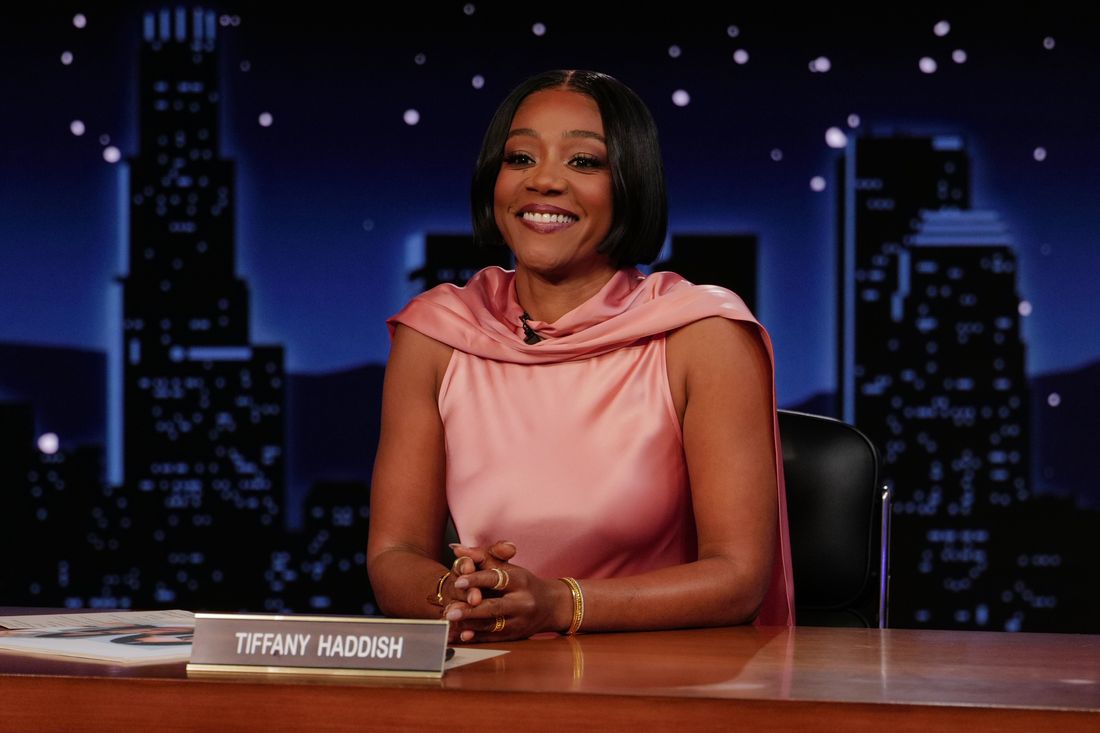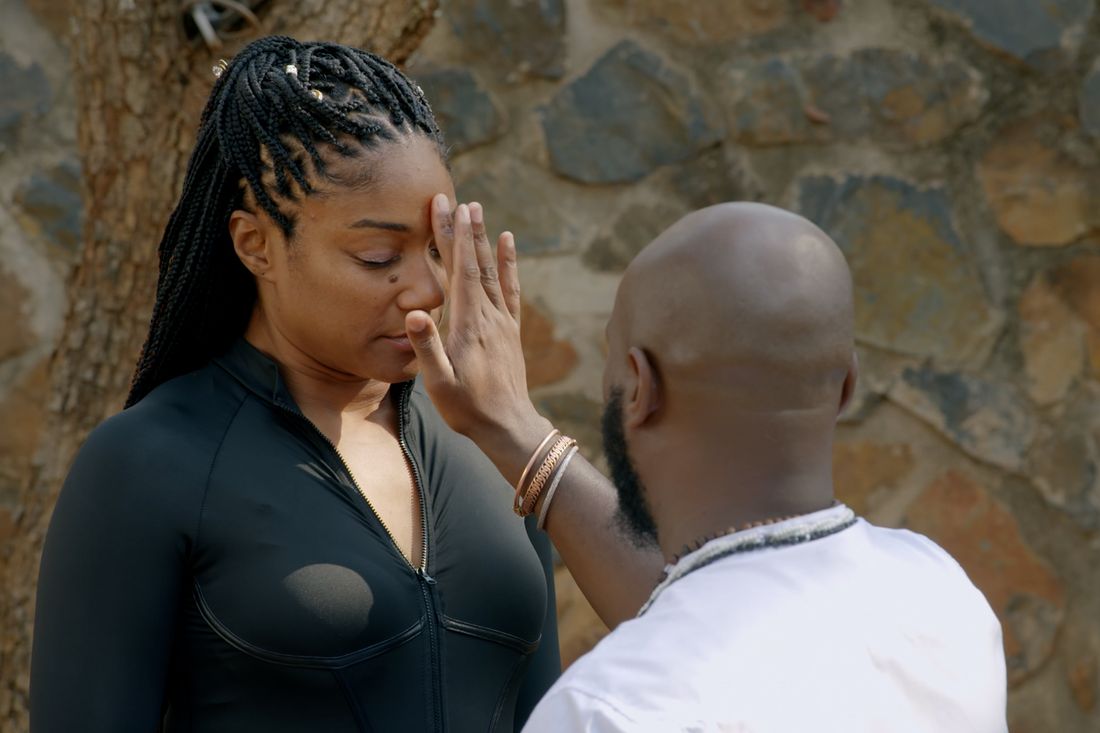
Backstage at the El Capitan Entertainment Centre in Los Angeles, Tiffany Haddish is wearing a pair of glasses that record video. The 45-year-old actress and comedian mentions she previously did an advertising campaign with Ray-Ban and was promised a pair of these glasses, but never received them. Looking at her reflection, she says she really dislikes when people don’t follow through on their commitments, then quietly adds that it’s a habit stemming from her experiences as a foster child.
It’s a bright summer afternoon in August, and Jimmy Kimmel is away on vacation, so Tiffany Haddish is filling in as host of his late-night show. Unbeknownst to everyone, she’s filming behind-the-scenes content for Kimmel’s website just weeks before ABC will unexpectedly halt production due to pressure from the Trump administration. For the moment, things are peaceful—Kimmel hasn’t yet publicly criticized Trump supporters for defending the person who attacked Charlie Kirk, and Haddish’s appearance seems to be part of an effort to revitalize her career.
Tiffany Haddish became a popular guest on Jimmy Kimmel Live! in 2017, the same year she gained widespread recognition for her role in Girls Trip. The movie, a comedy similar to The Hangover, followed four friends—Haddish, Jada Pinkett Smith, Queen Latifah, and Regina Hall—on a wild trip to New Orleans. Before this breakthrough, Haddish was a working comedian and actress, best known for a supporting role on The Carmichael Show. Interestingly, she wasn’t the first choice for that role either. The original actress playing Nekeisha had scheduling conflicts due to a stage play, so Haddish was asked to audition. She quickly won over the cast with her energetic and fun-loving personality. Lil Rel Howery, who played Bobby, recalls Loretta Devine saying she missed Haddish when the original actress returned. A similar situation occurred with Girls Trip. People in the industry secretly sent Haddish the script, believing her comedic style would be a better fit than other actresses being considered, like Leslie Jones and Niecy Nash. Director Malcolm D. Lee remembers watching Haddish’s audition tape and consistently finding it hilarious.
It was incredible! When Girls Trip came out, the reaction was explosive – it felt like we were launched into another world. Ali Wong, who I later worked with on Tuca & Bertie, said I was a real force in that movie, and suddenly everyone wanted to collaborate. It was especially meaningful because I’d auditioned for Saturday Night Live so many times and hadn’t gotten in, but now they were asking me to host! I said yes, and I was so proud to become the first Black woman to win an Emmy for it. Then Netflix wanted to do my next comedy special. 2018 was just a whirlwind – I even ended up on the cover of Time magazine’s “Time 100” issue, alongside people like Nancy Pelosi, Emmanuel Macron, and Jeff Bezos! It was a dream come true.
Looking back at Tiffany Haddish’s career, it feels like Girls Trip was a real peak – she hasn’t quite hit that same height since. She snagged a few roles that seemed promising – Night School with Kevin Hart, Like a Boss with Rose Byrne and Salma Hayek – but honestly, they didn’t really stick with audiences. The exception was Tuca & Bertie, a fantastic animated show that, sadly, got canceled not once, but twice. Then, just as things were starting to shift, the pandemic hit, delaying projects like Paul Schrader’s The Card Counter, where she had a compelling role opposite Oscar Isaac. But it wasn’t just the industry slowdown; some of Haddish’s public behavior started to raise eyebrows. I remember watching her guest-host The Ellen DeGeneres Show in 2020, and her interview with Marlon Wayans was… memorable. She playfully grilled him about why he hadn’t cast her in a movie, and his response was pretty telling: he jokingly said she could be ‘inappropriate’ on set, even suggesting she’d try to sit on an actor’s lap and… well, you can imagine. It was a funny moment, but it hinted at a pattern that would eventually start to impact her image.
Director Matt Howery describes Tiffany Haddish as a naturally playful and distracting force, similar to a mischievous kid in class. He admits that when she starts being silly, they often just let her have fun so they can get their work done. Both Howery and Marlon Wayans express their affection for Haddish and acknowledge her incredible talent. Wayans notes that she’s grown a lot and understands that great comedy relies on good timing.
During the early days of the pandemic, Tiffany Haddish spent much of her time recovering from a knee injury at home, even performing stand-up routines for her plants. Things didn’t improve much when work resumed. In 2021, she ended a year-long relationship with Common over the phone. 2022 brought further heartbreak with the deaths of her dog and the grandmother who had helped raise her and her siblings. That same week, she also lost a mentor, Bob Saget. Later that year, she was arrested twice for driving under the influence, once in Georgia and again in November. Adding to her difficulties, she and Aries Spears were named in a lawsuit in September alleging sexual abuse of two children in comedy skits, including a controversial 2014 sketch. The lawsuit was quickly withdrawn, and the children’s mother was ordered to pay Haddish nearly $100,000 in legal fees. Despite this legal victory, Haddish felt her career had been severely damaged. She told TMZ at the time that she had lost all of her work.
Looking back after three years, Haddish says the initial despair she felt didn’t last. She realized it wasn’t a loss of work, but a temporary pause before things started up again – she was back on set within two weeks. While her work history appears consistent, some recent projects seem aimed at rebuilding trust with audiences. Tonight, she’s performing at the Laugh Factory as part of L.A. Comic Con. And in November, her new Peacock reality show, Tiffany Haddish Goes Off, premieres, featuring her and her childhood friends – a clear attempt to recreate the success of Girls Trip.
Tiffany Haddish doesn’t view her current success as a return to form; she says things are simply continuing as usual professionally. The biggest changes, she explains, have been personal. She realized who her true friends were after discovering that people she trusted didn’t support her when she needed them most. She’s been sober for two years, which she says has improved her sleep and ability to connect with others. She’s also prioritizing exercise, particularly barre, and trusting her instincts when it comes to relationships. Haddish, who has overcome a difficult past including abuse and homelessness, now recognizes that controlling behavior isn’t love. She’s learned to pay attention to her gut feelings – literally. She recalls feeling physically ill, even experiencing stomach problems, whenever she was around a former friend who later tried to sue her, and now uses that as a sign to distance herself.
Throughout our conversation, Tiffany Haddish repeatedly mentioned checking to see if she felt comfortable around me. After about an hour of talking, she suddenly said she’d made a decision about how she felt about me. She explained, “I don’t feel any tension or discomfort around you – my stomach doesn’t hurt.”

I first noticed Haddish might be letting her impulses guide her while watching a taping of Kimmel. She really valued having creative freedom as a guest host for a week, something she didn’t always experience on late-night TV. She explained that when she hosted SNL, she constantly had to convince the writers to take her ideas seriously, which frustrated her, as she wrote in her memoir, I Curse You With Joy. But Kimmel is completely different. “I feel safe and free to express myself,” she told me. “They give me some direction, but then say, ‘Here’s the general idea—now go with it and do whatever you want.'”
One of the perks of hosting the show is that Haddish gets to invite her own guests. This week, she welcomed Selena Martin, Shermona Long, and Shermona’s sister, Sparkle Clark – the group she traveled with to South Africa, Zimbabwe, and Tanzania last summer for her show, Tiffany Haddish Goes Off. (They weren’t able to visit Eritrea, where Haddish’s father is from, due to travel warnings and safety issues.) Today, she’s also surprising two of her middle school teachers, Mr. and Mrs. Jones, by inviting them to the taping as a 50th-wedding-anniversary gift. This is Haddish’s last appearance on Kimmel, so she’s interviewing high-profile guests: Jessica Williams, recently nominated for an Emmy for Shrinking, and Mark Rober, a former NASA engineer and popular YouTuber with over 71 million subscribers.
Tiffany Haddish brought Stephen J. Cloobeck, a candidate for California governor, onstage. Cloobeck, 64, previously led the time-share company Diamond Resorts and is a Democratic donor known for being assertive. He publicly threatened to stop donating to the Democratic party in 2017 if they criticized wealthy individuals. While he’s financially successful, Cloobeck isn’t widely recognizable – even his own employees didn’t know him when he appeared on Undercover Boss. Haddish introduced him as a philanthropist who helped people in Altadena, and then, in an awkward and lengthy 15-second bit, she taught him how to do the Nae Nae dance.
“I trust you, Stephen,” she said with a laugh as Cloobeck sat down. I later asked Haddish how Cloobeck won her support. She explained that she’d seen him at parties for years. Eventually, she started asking his advice about investing in real estate – she owns several properties – and when he mentioned running for office, she told him she’d support him. “Running a government is a lot like running a business,” she explained. “He’s great with people – excellent, actually. Every hotel or resort he’s owned, I’ve had a fantastic experience.”
Tiffany Haddish doesn’t just apply financial responsibility to politics; she sees it as a sign of overall character. In a segment from her appearance on Kimmel, she even sent staff to Hollywood Boulevard to find potential dates, and one of her first questions for them was, “What’s your credit score?” Anyone with a score in the 600s or below was immediately rejected. I later asked her about this, noting that she also mentions credit scores in her memoir when discussing potential partners. She explained that she doesn’t trust people with low credit, reasoning, “If a bank won’t lend me money with a score under 625, why would I invest my time and body into someone with poor credit?” She views relationships through a capitalist lens, believing everyone seeks some kind of gain from others—whether it’s an experience, a laugh, money, or something deeper.
Tiffany Haddish’s difficulty with trust stems from a deeply traumatic childhood. Her father, an Eritrean immigrant who came to the US as a refugee, left her and her mother when Tiffany was just three years old. When she was eight, her mother didn’t return from work one night and was later found to have suffered a severe brain injury in a car accident. Though she recovered, her mother’s personality was drastically altered, and she became verbally and physically abusive towards Tiffany, often calling her names and even attacking her. Diagnosed with schizophrenia, her mother was institutionalized when Tiffany was thirteen. For the next five years, Tiffany and her siblings moved between foster homes, where she experienced both physical and sexual abuse. This constant upheaval reinforced feelings of being unwanted. Adding to the trauma, her stepfather allegedly admitted to tampering with her mother’s car, potentially causing the accident. While Tiffany investigated this claim, she couldn’t prove it. Her grandmother took custody of her and her siblings at fourteen, but couldn’t afford to care for them, so they remained in foster care. These experiences left Tiffany with low self-esteem that followed her into adulthood. She later met her husband, William Stewart, on a cruise ship, initially mistaking his intrusive behavior for affection. He earned her trust by finding her estranged father. However, she later accused Stewart of being abusive and controlling, alleging physical violence and surveillance. They divorced in 2013. A few years later, her father disappeared again and eventually died of heart failure in 2017, seemingly unable to overcome the guilt of abandoning his family.
A few hours after Jimmy Kimmel’s show ends, I met Tiffany Haddish at the Laugh Factory, a famous comedy club in Hollywood. This is where Marlon Wayans and his brother Shawn first noticed her years ago – a bold 16-year-old who took the bus from South Central to attend a comedy workshop. (Marlon said she even tried to flirt with Shawn!) The Laugh Factory became a safe haven for Haddish; her social worker got her into the club’s youth program instead of therapy, and she believes it saved her life. The event she was headlining, Nerd Night Out, was as quirky as it sounds. The host, who went by “John Goblikon,” was dressed as a goblin with a long nose, green makeup, and pointy ears. Haddish had been a guest on his podcast before and thought highly of him. However, when she went onstage, she didn’t do stand-up as expected, but sat down for an interview with Goblikon. She felt misled by this change of plans and immediately argued with him over who would sit where. “I don’t like being tricked,” she explained. She said Goblikon apologized afterward with a long text, but the incident also touched on Haddish’s deep-seated need to feel secure. “I feel really safe onstage,” she said. “I know there are a lot of people around if anyone tries anything.”

Marlon Wayans observes that Tiffany Haddish’s constant need to make people laugh can sometimes be problematic. He describes her as someone who simply doesn’t care what others think, which he sees as both a strength and a weakness. Haddish often breaks social norms to put others at ease – for example, she loudly shared flirtatious messages from her hairdresser when we first met backstage at Kimmel. According to Deon Howery, she does this because she wants everyone to feel comfortable and enjoys making people smile. However, this behavior sometimes crosses the line into attention-seeking. In September 2024, she walked the runway during a Monse fashion show on a dare from Kathy Hilton, which some found funny but others considered disrespectful. More recently, in August of this year, Haddish posted photos suggesting she and her friend Jason Lee had a baby together, which turned out to be a publicity stunt designed to promote adoption awareness. She has openly discussed her struggles with endometriosis.
Tiffany Haddish faced legal issues because of a 2014 comedy sketch, but she insists she had no involvement in creating or editing it, and doesn’t appear in its most disturbing parts. The sketch, which is still available on YouTube with some content removed, is widely considered to be in very poor taste – Haddish had been trying to get it removed from the internet for years before the lawsuit, and it was eventually taken down by Funny or Die. It depicts Haddish as a mother who leaves her son with his uncle, played by Kevin Spears, unaware that he is a pedophile. The scenes are shown from the uncle’s perspective and show the child undressed, including in a bubble bath, with seemingly innocent moments twisted by the uncle’s disturbing thoughts. Haddish says she didn’t approve of the final product and that it differed from the original script. Even if she hadn’t known how bad it would be, her involvement raises questions about her judgment, particularly because she helped cast the child – a favor for the boy’s mother, whom Haddish financially supported and who hoped to create a demo reel for her children to pursue acting careers.
Tiffany Haddish’s need for approval has sometimes led her to associate with problematic figures. For example, in 2018, she visited Eritrea and was photographed with Isaias Afwerki, the country’s long-standing and authoritarian leader. Afwerki has been criticized for imprisoning those who oppose him and for a system of indefinite national service that many consider forced labor. Haddish returned in 2019, became a citizen of Eritrea, and gave Afwerki a copy of her book, The Last Black Unicorn, with an inscription thanking him for his work.
Eritrean communities living outside of Eritrea quickly reacted with strong disapproval after Tigist Haddish’s statements. Many believed she was downplaying the problematic actions of President Afwerki, and she agreed to discuss their concerns in a Twitter conversation with a group primarily composed of Eritrean Americans. However, the conversation didn’t go as planned. While Haddish seemed genuinely open to understanding their perspective, she confessed to losing focus and even falling asleep while reading through the feedback. She defended Afwerki by sharing a personal anecdote – he had given her honey from his farm – and explained that she was thanking him for building dams and bringing electricity to rural villages, based on what she had been told.
When I asked Haddish about the online discussion, she said she appreciated the young people who were talking about it. However, she also felt their criticism wasn’t entirely fair, explaining that they hadn’t experienced the conflicts that led to Afwerki gaining power and forced her father to leave their home country. “I understand why they’re critical,” she acknowledged, adding that Afwerki “hasn’t always made the best decisions, but he has protected his country in a way.” Haddish compared the president to “a gang leader just trying to protect his group,” but she strongly objected when I called him a dictator. She recalled seeing him in simple clothing – Velcro sandals and driving an older Toyota 4Runner – stopping in villages to talk to people and even giving her peaches. “If he went out of his way to do something nice for me, then good for me,” she said. “I’m important.”
I read this profile of Tiffany Haddish, and it really struck me how she likes to form her own opinions by seeing things firsthand. But it also seems like she can be a little too trusting, especially when people are friendly. She’s particularly susceptible if someone talks about safety. Apparently, she visited Israel in February 2024 – she converted to Judaism a few years back after her father passed – because she thought she’d get a more honest look at what was happening with the war going on. But like with most celebrity visits, her trip was pretty controlled. She mostly saw Tel Aviv, Haifa, and this place called Dimona, which is home to a community of Black Hebrew Israelites. She said it felt like a place where everyone could live together peacefully, though she quickly added that she was only there for a few hours, which felt a little telling.
I asked if she had ever been to the Palestinian territories. She told me she’d wanted to visit, but wasn’t allowed. Instead, she saw the aftermath of attacks on Israeli communities – destroyed homes and rockets being fired – and the memory is still incredibly powerful. Even as she described it, her voice broke and she started to cry. She remembered “death” and “burning buildings,” and said you could still smell the smoke. Haddish is a talented actor because she vividly remembers everything she’s experienced, and I noticed this several times during our conversation. It’s like every hard or upsetting thing she’s gone through is right beneath the surface. As she explained, when she talks about these experiences, it’s not just a story – she feels them again, as if her whole body is reliving the moment.
As a longtime moviegoer, I was really shocked to learn about Tiffany Haddish hosting that pro-Israel rally in D.C. last November. By that point, the situation in Gaza was horrific – over 43,000 Palestinians had already been killed, and it was becoming painfully obvious what Israel was doing to Palestine. It felt like those organizing the rally needed a well-known personality to try and spin the narrative. I remember seeing clips of her on stage, saying things like, “We have U.S. soldiers and IDF heroes with us today, Israeli artists and American performers – that is what Jewish unity looks like.” Honestly, it just felt deeply unsettling given the context.

Tiffany Haddish says she has no regrets about headlining the rally, even with everything that’s happened in the past year. She clarifies that while she doesn’t support the Israeli government, she does support the Israeli people – a point that seems complicated by her praise for soldiers. Haddish explains that she uses stand-up comedy as a way to challenge her own beliefs. She’ll share an opinion, then gauge the audience’s reaction, which often leads to a new realization. “I say it out loud, and the audience might react in a way that makes me think, ‘Oh, what’s that about?’ And then, suddenly, I learn something new,” she explains. Friends and colleagues consistently describe Haddish as honest, and she’s clearly comfortable admitting when she doesn’t know something. It’s not entirely clear, though, if she feels more freedom to be open and honest onstage because she feels less pressure to answer to others while performing.
Tiffany Haddish isn’t worried about criticism or potential backlash. As she puts it, she might face some negativity, but she’s financially secure and will be okay. We’re talking in the middle house of three she owns next to each other in South Los Angeles – she uses this one for guests, and her other two houses are for her and her cousin. Haddish feels safe in this neighborhood, which surprises some of her famous friends. Kevin Hart has suggested she move, but she points out that Arsenio Hall’s home in a wealthier area was broken into twice, proving that criminals target areas with valuable possessions. During our conversation, Haddish spent a lot of time explaining the complex neighborhood disputes happening around them, including a personal conflict with a realtor who tried to drum up business by sharing Haddish’s address with potential buyers.
According to Shermona Long, a member of the crew for Tiffany Haddish Goes Off, Tiffany doesn’t quite see herself as a celebrity and actively works to stay grounded. She still does everyday things like laundry and cleaning, and regularly spends time with her lifelong friends, who she’s known since her teenage years. These friends are vital in keeping her connected to reality. The resulting docuseries feels like a much more lavish version of Girls Trip, complete with luxuries like a private chef and international travel. By the time the group reaches Zimbabwe, the final stop on their trip, Haddish admits she’s feeling unfulfilled despite her success, largely due to struggles in her romantic life. She decides to stage a symbolic wedding ceremony, walking down an aisle in a formal dress and ‘marrying’ herself in front of a mirror. While the ceremony, officiated by her friend Sparkle Clark with a playful tone (“We are gathered here today to celebrate the love of Tiffany and Haddish”), is partly a joke – Haddish even reads her vows in two different voices – it’s also a genuine attempt to prioritize self-love. She explains to the camera, “It’s really hard to love yourself, because you know what your flaws are.”
Read More
- Tom Cruise? Harrison Ford? People Are Arguing About Which Actor Had The Best 7-Year Run, And I Can’t Decide Who’s Right
- What If Karlach Had a Miss Piggy Meltdown?
- How to Complete the Behemoth Guardian Project in Infinity Nikki
- Yakuza Kiwami 2 Nintendo Switch 2 review
- Gold Rate Forecast
- This Minthara Cosplay Is So Accurate It’s Unreal
- The Beekeeper 2 Release Window & First Look Revealed
- Burger King launches new fan made Ultimate Steakhouse Whopper
- Brent Oil Forecast
- ‘Zootopia 2’ Is Tracking to Become the Biggest Hollywood Animated Movie of All Time
2025-11-06 14:59